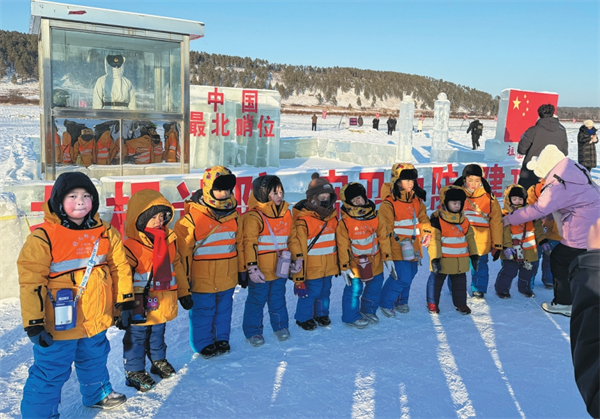Home>Government bulletin
Harbin's agri-products going global
Updated : 2014-09-18
By ( chinadaily.com.cn )

The Harbin World Agriculture Expo emphasizes on natural food. [Photo/China Daily]
More Chinese cities as well as countries and regions overseas can enjoy green and organicfood produced in Harbin due to efforts by the city government to build a large modern foodstorage and distribution system.
The system includes a food logistics center with an annual handling capacity of more than 1million tons, three distribution centers with a combined annual handling capacity of 1.5 milliontons and 11 grain depots each with a storage capacity of 200,000 tons.
It also signed a contract with Jiangsu Yurun Group, one of the leading food processingcompanies in China, to establish a global farm product procurement and cold-chain logisticscenter that will serve more than 80 distribution routes and have a daily handling capacity of300,000.
A 100,000-ton cold storage room and 50,000-square-meter in support facilities are now underconstruction.
Another Jiangsu company - BGX Logistics Development Co - has invested nearly 1.3 billion yuan($212 million) to start a logistics park in the city.
Qian Hao, a regional general manager of the company, said many consumers in southern Chinaare especially fond of rice and other specialties from Heilongjiang, but the price is very highwithout direct distributing channels, so "our project aims to satisfy the market demands whilelowering costs".
Long a national agricultural base, the capital of Heilongjiang province is known for its conditionsto grow world-class rice, corn and soybeans due to its abundant water, beneficial weather andfertile black soil.
More than 90 percent of the city's farmland is organic-rich black soil.
The city government also made efforts to bring more real benefits to local citizens and increasethe income of farmers by helping supermarkets set up partnerships with local rural cooperatives.
A flagship store for local green food opened in April offering fresh high-quality fruit andvegetables with similar price charged in morning markets. The store manager said most of thecommodities are brought directly from farmers through the rural cooperatives to bypass allmiddlemen, so the price can be 15 percent to 20 percent lower than in other markets.
Large supermarkets such as Carrefour, Walmart and RT-Mart have also establishedcooperatives.
The initiatives have helped farmers increase their income by 30 percent, local officials said.
Peng Chunhui, deputy director of the province's leading farm product logistics company, calledfor a diverse and professionally organized distribution channel in today's "cross-border era".
While the logistics chain continues to mature, farmers in Wuchang have already started at least400 online stores selling the area's famous rice.
Peng suggested that they should revamp their business model to O2O - online to offline – to attract even more clients.

Harbin ramps up childcare services
A new comprehensive service center for childcare in Harbin is expected to be finished by the end of the year.
-
Talent policies drive enterprise development in Harbin
Harbin's "30 New Talent Policies" represents an iterative upgrade to the talent policy system, helping attract and retain talent to bolster economic and social development.
-
Official website of 2025 Asian Winter Games goes live
Harbin, the host city of the 9th Asian Winter Games, has announced that the official website for the 2025 event has recently gone live.
-
Harbin launches measures to facilitate more foreign trade
In the first three quarters of 2023, the total import and export value of Heilongjiang province's goods trade hit 218.22 billion yuan.





